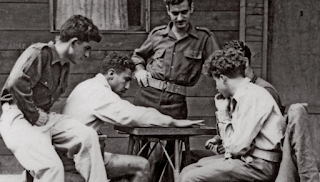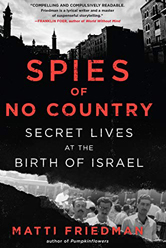
They were pioneers of the new state of Israel, risking their lives for it, yet their contribution has remained secret – until Matti Friedman began researching the story of Israel’s ‘mistarvim’ – Arabic-speaking spies born in Arab countries – for his new book, ‘Spies of No Country’. Read his piece in The New York Times:
Who is Jamil Cohen? He isn’t famous, and his name was new to me when I began researching a book about Israel’s first spies. But his story is a window onto some crucial and forgotten Israeli history.
Playing backgammon in the ‘Arab section’
Cohen was born in 1922 in Damascus, Syria, and grew up in the alleys of that city’s ancient Jewish Quarter. The existence of such a quarter seems unimaginable today, with the Arab world’s old ethnic mosaic largely destroyed by state persecution, religious violence and civil war. But when Cohen was growing up, there were about one million Jews native to Islamic countries, most of them Arabic speakers. Baghdad, the Iraqi capital, was one-third Jewish in those days.
At 21, facing an uncertain future amid the Muslim majority, Cohen decided to run away to join the Zionist pioneers forging a new Jewish future in the country next door: British Mandate for Palestine. He crossed the border on foot and joined a group of idealistic young people working the land at a kibbutz. It was the beginning of 1944, with World War II still raging and the creation of the state of Israel still four years away.
In oral testimony recorded in the 1990s, Cohen remembered what the experience was like. He was exhilarated by the comradeship and ideology of pioneer life. On the other hand, he was different from the others and found the difference hard to escape. Although Palestine had an old community of Jews who spoke Arabic, the native tongue of most Jews in the country at the time was Yiddish: They had come to the Middle East fleeing abject poverty and oppression in Poland and Russia.
To the kibbutz pioneers, Jamil Cohen was mystifying. He seemed Arab — in his appearance, in his Hebrew accent, in the music he loved, like that of the Egyptian diva Oum Kalthoum. He stopped using the Arabic name of his childhood, Jamil, and instead used his Hebrew name, Gamliel, but that didn’t resolve the problem. Cohen made friends but didn’t talk about his old life in Damascus; they weren’t interested. “Because I was the one who wanted to join them, and not the other way around,” he remembered much later on, “I was the one who was worn down, who had to round his edges to fit the machine that spins around, sparing no one.” The ability to “round your edges” is useful for a spy, as he’d soon find out.


Leave a Reply